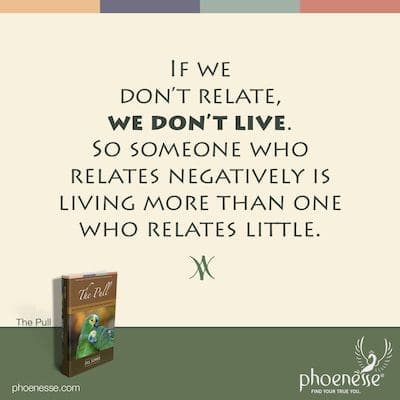Life may be many things, but more than anything else, life is relationship. If we don’t relate, we don’t live. It’s all relative to our attitude, whether positive or negative. The minute we relate, we live. When we are in destructive relationships, we are heading for a climax that is ultimately going to do away with the destructiveness. Kaboom. Further down the scale is the lackluster relationship that fizzles under a guise of false serenity. So even someone who relates negatively is living more than one who relates little. And absolutely no one relates not at all—for then they wouldn’t be alive.

We tend to only associate the word “relationship” with interactions with other human beings. But the word applies to absolutely everything, including ideas as well as inanimate objects. It also applies to our life circumstances, the world we live in, and our thoughts and attitudes. We can relate to lots of things, and to the degree we do so we will enjoy a sense of fulfillment rather than frustration.
It’s enormous, the scale of possibilities for relationship. Lowest on the totem pole is the mineral. You may think it can’t relate at all, but that’s not true. Since it lives, it relates. But because it’s a mineral, it can’t relate very much. Its way of relating is confined to total passivity. A mineral can be admired. An animal, by contrast, has a lot more moxie. It actively responds to nature, to other animals and to people.
Humans are highest on the scale of able-to-relate, which is a wider scale than most of us realize. The bottom rung of the human scale starts with the completely insane—the one in solitary confinement or who is locked behind bars. These two aren’t so very far apart. They are living lives in inner and outer isolation, hardly able to relate to other people. Since such people are living, they must somehow continue to relate, but it is mostly to things, their space, their food, their bodies and maybe some art, or ideas or nature. It can be helpful to think about life from this perspective.
On the highest rungs of the ladder are the folks who are able to relate beautifully. They aren’t afraid of becoming deeply involved with others and don’t protect themselves against experiences or feelings. They are able to love, and they let themselves love. And in the end, loving requires a willingness and readiness to do so.
At this level, people are willing to love regardless of risk. They can love abstractly or concretely, and generally or personally. This doesn’t make such people saints or holier than thou. In fact, they may well be far from perfect. They will have faults and be wrong at times. They have those pesky negative emotions too. But on the whole, they love. They aren’t afraid to get involved. Freed from their defenses, they are able to ride through occasional setbacks and have full and fruitful relationships.
So what about the rest of us who are somewhere in the middle—the average Jane or Joe? It’s a combo-deal with endless possibilities. Perhaps we relate well in some areas but are noticeably stopped-up in others. We’ll need some deep personal insight to know which is going on where.
What’s harder to spot are the situations where we relate well on the surface but our relationships are devoid of depth and meaning. It’s so super-easy to deceive ourselves: “Just look at how many great friends I have. My relationships are fine, it’s only that I’m lonely, unhappy and unfulfilled.” If this is our situation, we’re kidding ourselves. Our relationships aren’t that great if they’re not nourishing our soul. Or maybe we aren’t really so willing to relate.
In short, these two things are mutually exclusive: having genuine relationships and being lonely and unhappy. If we’re superficial—perhaps even pleasant and distracting—but somehow shallow, we’re not revealing our true self. And that’s going to leave a hollow feeling in the pit of our stomach.
When we don’t relate, we don’t give others what they’re looking for, whether they know it or not. This is caused by on unconscious fear of exposing all our various inner ills. If we’re not up to the task of resolving what needs to be worked on, we’re not in the bucket for forming meaningful relationships. Ergo, we’re going to be left feeling unfulfilled.
Most of us have some capacity for getting involved, but it’s usually not enough. We act out the drama of mutual exchange but it’s only skin-deep. Those unconscious tendencies that are swimming at deeper levels are eventually going to cause snags, especially if our shallow relationship is actually a close one. If a shallow relationship never becomes close, that’s not exactly a tie game—it’s a big loss. Because it’s a lost opportunity to surface issues and dissolve them, which would automatically take any relationship to more profound depths.
But maybe it’s not so clear what constitutes a profound and meaningful relationship. Sometimes we think it’s a mutual exchange of ideas. Other times, we think it’s sharing sexual pleasure. Both could be there and yet the communication isn’t very deep. The true criterion is always and only this: how genuine are we? How open are we? How undefended are we? Also, how willing are we to feel whatever we feel, to exposing ourselves and what matters to us?
We may notice that there are few people we would be willing to express our real sorrows, needs, worries and wishes with. Very few, if any. But to the degree we permit ourselves to be aware of these feelings, to that degree we’ll find a few others we can share them with. We can realize our longing to understand and feel understood. If we shy away from this, we’ll stay in isolation. We’ll end up fearing death because we let our life pass us by, clinging to the pseudo-safety of solitary confinement.
Our ability to admit the truth is a cornerstone for doing the work of self-discovery, and only then can we have real relationships. In addition to the way we relate to people, our relationships with nature, the arts and ideas will transform. They will become alive and no longer used as substitutes for something more meaningful.
Often we go overboard, confusing real relating with a childish compulsion to spill our guts. So then we may share our feelings without discrimination and jeopardize ourselves in the process. We mistake foolish candor or unwise exposure—or worse yet, cruel “honesty”—for proof of how open we are. This is a subtle cover up for withdrawing that works by provoking “proof” that it doesn’t pay to get involved.
Once we liberate ourselves from our self-inflicted prison by learning to understand ourselves better, our self-revelations won’t be so strained. We’ll intuitively find the right people to share the right amount of information with in the right way. We won’t be crushed by occasional missteps. But this kind of organic unfolding can only happen slowly. And only after we started to pursue a path of self-knowing.
This ability-to-relate meter is used a lot by psychiatrists to evaluate people. Oddly, sometimes more disturbed people can receive help more readily than those who are more “together.” The latter tends to deceive themselves that things are not so bad, so they can keep hiding from the truth within themselves. Those who are more disturbed don’t have this form of subterfuge at their fingertips.
Those who are fairly disturbed have to come to make the choice to either look their inner life square in the eyes, free from deception, or have a severe breakdown, effectively postponing any further self-confrontation. Even if they only reach the point of decision in a later life, they may still be closer to making it than someone who is more mildly neurotic but continues to be evasive.
If we can’t admit we’re human and in need of help to expose our vulnerabilities, we can’t be helped. And we then can’t form real relationships either. So our life will remain empty in some important ways. We may find we’re still at the point where we don’t know how to relate, where we’re mostly concerned with ourselves, and our efforts to be outgoing aren’t natural or spontaneous, but artificial and compulsive. But if we persevere, we’ll develop a natural concern and warmth towards others.
We each keep a wall around our heart. We need to get to know it if we want to comprehend our loneliness. Our goal is to understand how we affect others and in return, understand their affect on us. Often we don’t permit ourselves to feel the real effect. We color things until we are no longer in truth. It is by working privately on our issues that we expand in self-awareness. And by revealing ourselves in groups of like-minded souls we can come to understand how to live fully through meaningful relationships.
Return to The Pull Contents
Read Original Pathwork® Lecture: #106 Sadness versus Depression – Relationship



